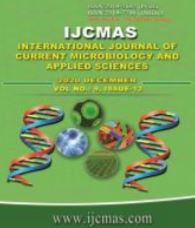


 National Academy of Agricultural Sciences (NAAS)
National Academy of Agricultural Sciences (NAAS)

|
PRINT ISSN : 2319-7692
Online ISSN : 2319-7706 Issues : 12 per year Publisher : Excellent Publishers Email : editorijcmas@gmail.com / submit@ijcmas.com Editor-in-chief: Dr.M.Prakash Index Copernicus ICV 2018: 95.39 NAAS RATING 2020: 5.38 |
Field trial on the effect of VAM and bioformulations on growth, yield and quality of fennel was carried out at KRCCH, Arabhavi, Karnataka during Rabi season of 2017 and 2018. There was significant variation was observed for growth and yield attributes of fennel due to application of VAM and bioformulations at 35, 70 days after sowing (DAS) and at harvest. The maximum plant height (40.59, 137.45 and 171.47 cm respectively), number of branches (9.50 and 23.86 respectively). Maximum number of umbels per plant (18.06, 17.70 and 17.88), 1000 seed weight (7.96, 7.64 and 7.80 g), seed yield (12.50, 12.00 and 12.25 q/ha), stover yield (19.30, 18.91 and 19.11 q/ha) and biological yield (31.80, 30.91 and 31.36 q/ha) were recorded by the treatment T9 (VAM 25 kg ha-1 + Panchagavya 3% + Amrutpani 3% + Vermiwash 10% (Drench) + Mulch (Sugar cane trash) in 2017, 2018 and pooled data. While the minimum value for similar attributes were recorded in treatment T2 (VAM 25 kg ha-1).
 |
 |
 |
 |
 |